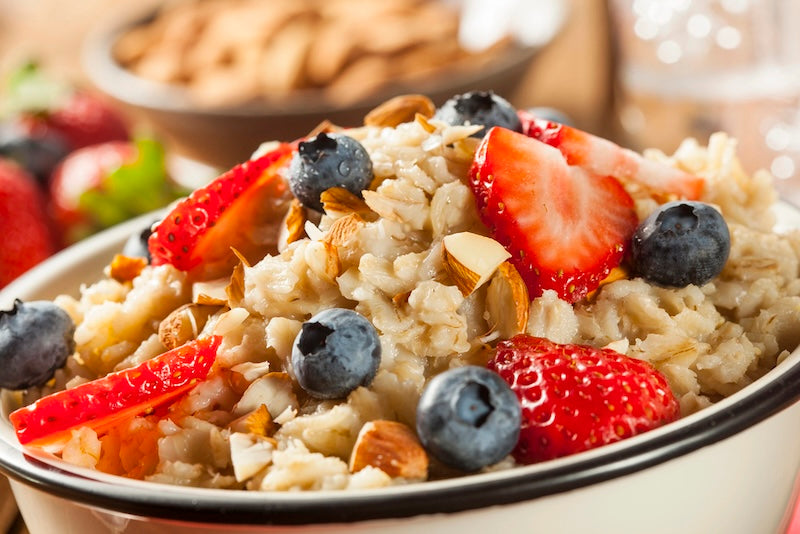Oats are a type of cereal grain from the Poaceae grass family of plants.
This grain in particular is the edible seed we often see in breakfast dishes. Oats are often thought of as a healthy food, known for being a source of antioxidants, a high fiber content, and vital vitamins and minerals.
You see many different types of oats in the grocery store and while all derive from the same ingredient, they are all made differently.
Steel-cut oats are made of the entire oat kernel that has been cut into two or three pieces using steel disks (hence the name).
Out of all the different types of oats, steel-cut is the highest in fiber due to its less processed nature. They are also the most difficult and time-consuming to cook.
Rolled oats, which are likely the most popular, are rolled flat. Because of this, the bran is removed making them less high in fiber than steel-cut.
Nutritional Facts About Oats
While the nutrition facts for oats will depend on the type and serving size, most rolled oats contain anywhere from 150-180 calories per ½ cup or 84 g serving.
They also contain 4 g of fat, 33-35 g of carbohydrates, and 5-7 grams of protein. Aside from the nutrition facts you can find on a label at the grocery store, oats also contain vitamins and minerals such as magnesium, zinc, phosphorus, and thiamine.
Are Oats Considered a High Protein Food?
Oats are not considered a super high-quality protein but with a few servings, you can get a fairly hefty chunk. They are also higher in protein compared to a lot of other grains.
With anywhere from 11-17% of the calories coming from protein and a ton of other health benefits, they are definitely worth adding to your diet. If you want to add more protein to your oats, there are several ways to do so.
Are Oats High in Fiber?

Oats are known for their high fiber content. Oats contain both soluble fiber, which is water soluble and said to help lower cholesterol and glucose levels, and insoluble fiber, which can improve bowel health and regularity. The fiber content depends on the type of oat you are consuming. As an example, just a half cup of dry, rolled oats contains 4 grams of fiber.
Be sure to check out our strawberry cream protein oats.
Are Oats Good for Muscle Growth?
Oatmeal can be a great additive to any diet, including for people who are trying to gain muscle. While they aren’t the highest in protein, they are a great source of essential vitamins, minerals, and complex carbohydrates.
The inclusion of oats in your diet can not only promote increased energy levels but can also aid in muscle growth and repair.
Are Oats Good for Weight Loss?
Oats have long been used in the fitness industry and health space as a vital ingredient for weight loss. Beta-glucan, which are the soluble fibers found in oats, can increase water and the thickness of digested food.
This increases the volume of food in your gut at one time and therefore increases satiety. Because they are also high in fiber, oatmeal can keep you fuller for longer and act as an appetite suppressant.
Not only are oats good for weight loss but there have been numerous studies on the heart-healthy benefits of eating oatmeal as well as lowered levels of cholesterol.

How to Increase Protein in Oats
First, you can add various types of protein directly into your oats when you make them.
For example, we like to add peanut butter to our oats for a little more calories, fats, and protein.
You can also add protein powder to your oats by adding a scoop before you add your water and throw it on the stovetop or in the microwave. You can also make overnight oats by adding some almond milk or cow's milk, greek yogurt, and chia seeds. This makes the meal higher in fat, protein, and nutrients.
Not to mention, swapping out your nightly dessert for baked oats where you can add eggs, peanut butter, and so much more is a great way to add protein and satisfy your cravings.
Lastly, you can try Naked Oats as a convenient and tasty high-protein oats option.







